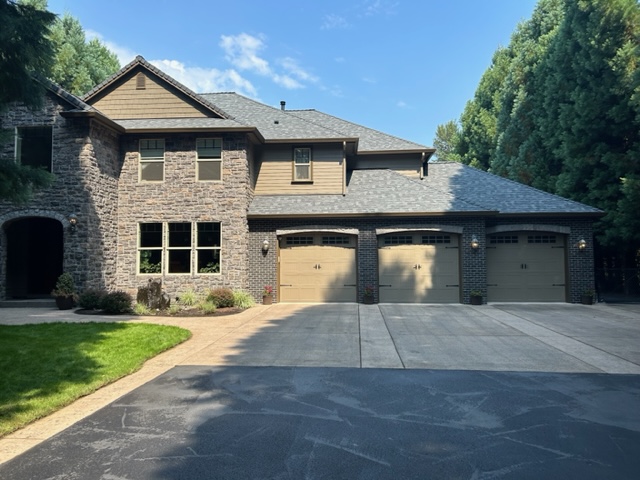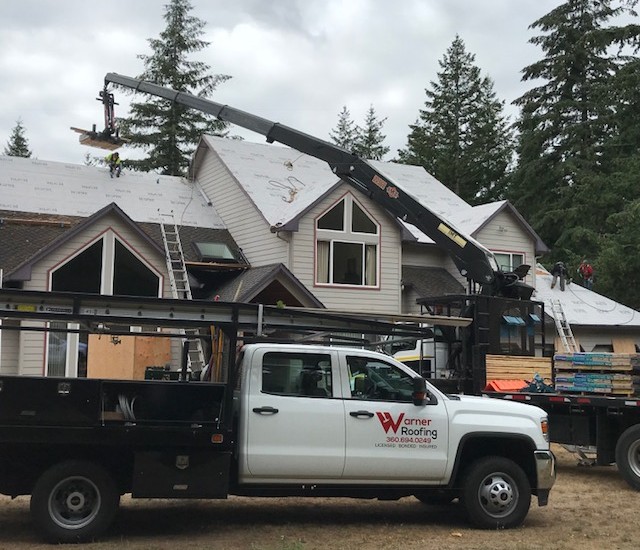
Updated on November 19, 2025
Composite roofing is one of the most adaptable, long-lasting, and visually flexible roofing options available today. But if you’re unfamiliar with the term, it may be unclear exactly what composite roofing is—or why it’s used in place of more traditional materials like wood, slate, or asphalt.
In this guide, we’ll walk through what composite roofing is, why it’s gaining popularity across the U.S., and how it compares to other types of roofing materials. Whether you’re building a new home or replacing an aging roof, understanding your options is the first step toward making the right decision.
What Does “Composite Roofing” Mean?
The word “composite” refers to something made by combining multiple materials. In roofing, composite shingles are engineered from a mixture of recycled plastics, polymers, rubber, and fibers, sometimes layered with mineral granules or asphalt-like coatings to improve weather resistance.
These blended materials are molded into shingles or shakes that closely replicate the appearance of natural materials like:
- Cedar wood shakes
- Slate tiles
- Clay tiles
- Architectural asphalt shingles
But unlike their natural counterparts, composite shingles are built to last longer, weigh less, and withstand harsh weather conditions with minimal upkeep.
Why Was Composite Roofing Developed?
Composite roofing was developed to solve the problems associated with natural materials:
- Wood shakes are beautiful, but prone to rot, mold, and fire unless specially treated.
- Slate tiles are elegant and long-lasting, but extremely heavy and expensive.
- Clay tiles are durable, but brittle and unsuitable for certain climates.
- Asphalt shingle roofs are affordable, but have a shorter lifespan and limited style variety.
Composite roofing materials combine the best of all these worlds—offering the appearance of traditional roofing with modern-day performance.
Are Composition Shingles a Good Value?
Yes—composition shingles offer one of the best values in residential roofing. They provide a rare combination of affordability, durability, and curb appeal that makes them attractive to a wide range of homeowners. While not the cheapest material on the market, composition shingles are significantly more cost-effective than premium roofing options like natural slate or clay tiles—yet they can closely replicate their look.
With a lifespan ranging from 30 to 50 years (depending on the product and installation quality), composite shingles reduce the need for frequent roof replacements. They’re also low maintenance, often resistant to impact, fire, and UV degradation, which means fewer repair costs over time.
Many composite shingles are also made from recycled materials, offering eco-friendly benefits without sacrificing performance. And with modern technology, manufacturers can now create high-end profiles that mimic the textures of wood shakes or slate tiles, adding visual value to your home without the weight or upkeep.
When you factor in longevity, aesthetics, and reduced maintenance, composition shingles strike a smart balance between upfront investment and long-term savings. For homeowners who want both performance and style without breaking the bank, composition shingles are an excellent value.
What Types of Composite Roofing Are Available?
Composite roofing comes in several styles to fit a variety of architectural tastes and home designs.
1. Composite Shake Shingles
- Designed to replicate the rustic, hand-split look of natural wood shakes
- More uniform and durable than real wood
- Often manufactured with Class A fire ratings
2. Composite Slate
- Mimics the dimensional texture and rich tones of slate
- Significantly lighter than natural slate
- Less likely to crack, break, or require extra roof reinforcement
3. Dimensional Composite Shingles
- Resemble architectural asphalt shingles
- Feature layered construction for added depth and shadow lines
- Ideal for homeowners seeking a classic look with modern performance
Each type of roof shingle in the composite category offers its own unique mix of aesthetics and functional benefits.
What Are Composite Roofing Materials Made Of?
Composite roofing materials vary by manufacturer but typically include:
- Recycled plastics (like polyethylene or polypropylene)
- Synthetic rubber for flexibility and impact resistance
- Fiberglass or polyester matting for strength
- Color pigments for realistic shading
- UV inhibitors and fire retardants for durability
Some brands also include a thin layer of asphalt to further improve water resistance, similar to asphalt shingles—though composite products are not the same thing as asphalt roofing.
How Does Composite Roofing Compare to Other Roofing Materials?
When evaluating types of roofing materials, composite shingles often come out ahead in multiple categories:
| Roofing Material | Lifespan | Maintenance | Weight | Fire Resistance | Cost |
|---|---|---|---|---|---|
| Composite | 30–50 years | Low | Lightweight | Often Class A | Mid to high |
| Asphalt Shingles | 15–30 years | Low | Lightweight | Class A | Low |
| Wood Shakes | 15–30 years | Moderate to high | Moderate | Requires treatment | High |
| Slate Tiles | 50–100 years | Low | Very heavy | Naturally fireproof | Very high |
| Clay Tiles | 40–70 years | Low | Heavy | Naturally fireproof | High |
Composite roofing offers an attractive middle ground—more affordable than slate, longer-lasting than asphalt, and lower-maintenance than wood.
Is Composite Roofing Eco-Friendly?
Yes, many composite roofing products are designed with sustainability in mind. Because they’re made with recycled materials and built to last decades, they reduce the frequency of roof replacements and divert plastic waste from landfills.
Some composite shingles are even fully recyclable at the end of their life cycle, making them a smart choice for homeowners who want both performance and peace of mind.
Is Composite Roofing a Good Choice for Harsh Weather?
Composite roofing performs well in a wide range of weather conditions, including:
- Heavy rains
- High winds
- Hail impact
- Extreme heat or UV exposure
The synthetic blend of materials used in composite shingles offers built-in flexibility and durability. Many options carry impact resistance ratings and warranty coverage up to 50 years, depending on the brand and product line.
How Much Does Composite Roofing Cost?
Composite roofing is more expensive than basic asphalt shingles but more affordable than luxury roofing types like slate or tile.
Average cost range:
- $5 to $12 per square foot installed
- Total cost depends on roof size, style of shingle, and local labor rates
Though it may cost more upfront, the longer lifespan, reduced maintenance, and aesthetic appeal of a composite roof shingles make it a smart investment over time compared to asphalt shingles.
How Do You Maintain a Composite Roof?
One of the biggest advantages of a composite shingle roof is its low-maintenance nature. Most homeowners only need to:
- Inspect regularly for storm damage or debris
- Clean the gutters to prevent water backup
- Remove moss or algae if it forms in damp areas
- Schedule professional inspections every few years
Unlike wood shakes or clay tiles, composite roofing doesn’t need sealing, staining, or major upkeep.
Frequently Asked Questions
Is composite roofing the same as asphalt shingles?
Not exactly. Asphalt shingles are typically made with a base of fiberglass and asphalt only, while composite shingles use a blend of synthetic and recycled materials for enhanced performance and realism.
How long does a composite roof last?
A well-installed composite roof can last 30 to 50 years or more, depending on the product line and local climate.
Can I install composite shingles over an old roof?
Most building codes recommend a full tear-off to ensure proper ventilation, flashing, and warranty coverage. Always consult a licensed roofing contractor before deciding.
Is composite roofing fire resistant?
Yes, many composite shingles are manufactured with Class A fire ratings, especially important in fire-prone or hot, dry areas.
What makes composite roofing cost-effective?
Composite shingles last longer than traditional roofing materials, require less maintenance, and often come with lifetime limited warranties, making them a strong return on investment.
Talk to Warner Roofing & Construction About Composite Roofing
If you’re exploring composite roofing for your home, Warner Roofing & Construction is here to guide you every step of the way.
We offer expert insights into all types of roofing materials and ensure a flawless installation every time.
Reach out to Warner Roofing today to get honest answers, high-quality service, and a roof that stands the test of time.
